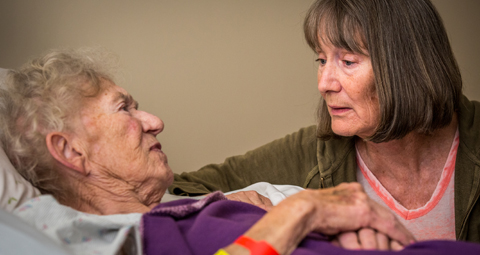BY Peter Diamond | March 1 2019 | ![]() 0 COMMENTS
0 COMMENTS ![]() print
print

Focus on palliative care not assisted suicide, MSPs urged
Publication Date: 2019-03-01
Comments by the Church and a care home manager come as a fresh move is made to call a new vote in parliament
The Catholic Church in Scotland has warned against fresh moves to legalise assisted suicide and to focus instead on palliative care—with a Paisley deacon, who is manager of a care home, urging the laity to lobby MSPs on the issue.
Extreme measures on euthanasia have been adopted in Belgium, the Netherlands and Canada.
Last week, a cross-party group of MSPs was established to campaign for assisted suicide in Scotland. The group includes interim leader of the Scottish Conservatives Jackson Carlaw, Scottish Greens co-convener Patrick Harvie, former Labour leader Kezia Dugdale and Liberal Democrats health spokesman Alex Cole-Hamilton. They claim there is ‘a groundswell of public support as they embark on a new drive to legalise assisted suicide.’
Meanwhile, pressure group Dignity in Dying is set to begin an online, press and billboard ad campaign next month.
A previous 2015 vote in the Scottish Parliament to change the law was rejected by 82 votes to 36.
Anthony Horan, director of the Catholic Parliamentary Office, said: “Any attempt to introduce assisted suicide in Scotland must be resisted. We cannot simply sit back and allow vulnerable people in our society to have their lives prematurely ended.
“We need to engage respectfully but passionately in this life or death debate and to argue for better palliative care; helping people to live, not die.”
Mr Horan believes that if such a law were passed in Scotland over time it would become ‘wildly out of control.’
“Proponents of assisted suicide talk of protections and safeguards, but once you legalise a procedure such as assisted suicide or euthanasia—even though it might be restricted to begin with— incremental extensions are inevitable.
“As time passes it is logical to expect mission creep to extend the law in order to cover more and more people until the law is wildly out of control. For example, very few would have envisaged assisted suicide or euthanasia being available to children, yet that is now the case in Belgium and the Netherlands.”
Vulnerable people
Mr Horan argued that vulnerable people could feel under pressure to take their own lives if a new law is introduced and he urged Catholics across the country to sign up to a campaign by Care Not Killing.
“Legalising assisted suicide will put pressure on vulnerable people to end their lives for fear of being a financial, emotional, or care burden upon others,” he said.
“This is especially the case for the disabled, the elderly, the sick or the depressed. The right to die can so easily become the duty to die.
“The dangers of legalising assisted suicide are real. We must resist it. Assisted suicide or euthanasia will change how we view healthcare and even the value of life. Our society should be preventing suicide, not assisting it.
“I urge all people to sign up to Care Not Killing (CNK) via their website to receive important updates and also to follow CNK on social media.”
Palliative care
Deacon Graham Kelly, 61, of Paisley Diocese, is a manager of Fullarton Greenbank Care Home, Irvine and believes that education around palliative care is the key to winning the argument on assisted suicide. “If there is a plan to push for assisted dying in Scotland it would be a very slippery slope indeed,” he said.
“It would fundamentally mean politicians deciding whether or not someone should live or die and they have no right to do that.
“As Catholics we have a role to play on the issue, particularly the laity. We need to let our MSPs know and voice concerns about any dangerous proposals which may be ahead.”
Deacon Kelly believes better education on dying and end of life care would be a way to tackle the issue.
“In this country we have very good palliative care—there are skilled doctors and nurses who can control pain very easily now with the drugs that are readily available,” he said.
“I see very good end of life care in the home where I manage and we receive good feedback from families about providing dignity, love and respect. As an organisation we include the family as part of the team who make decisions for those patients who cannot make decisions for themselves, for example someone suffering from progressive dementia.
“We engage these families issues and advise them on things like legal power of attorney, which allows a relative to act on ones behalf when the capacity to make decisions is no longer there.”
Deacon Kelly said death is ‘still something of a taboo subject’ and that the Church can help by offering support to families of those who are dying.
“We need to get better at preparing for it but that should never go as far as assisted suicide,” he said.
“Educating families can make a huge difference to the decisions that are made at the end of someone’s life.”
Deacon Kelly, who has been a registered nurse for over 20 years, in his experience people who have ‘declined and look to be close to the end’ can often recover.
“That ability to bounce back can give people an extra month or year with their loved one which is absolutely cherished,” he said.
In 2015, First Minister Nicola Sturgeon told the SCO that she was not convinced by the arguments for assisted suicide. “I believe we should support people to live and I am therefore in favour of good quality palliative care,” she said. “There also remains a major stumbling block to assisted suicide: How could you have sufficient safeguards?”
Bill Scott, of Inclusion Scotland, the national disabled people’s organisation said he was aware of the new cross-party group but that he does not yet know exactly what they are proposing.
“Previously their intentions have always failed to meet our demands and therefore we have never supported any of their previous campaigns including the one that stated that ‘all disabled people should be entitled to end their life.’
“We look at other countries where assisted suicide has already been implemented and we worry at the dangerous precedent which has been set because the evidence is out there. The initial outlay of administering euthanasia to terminal patients is extended to everyone,” he said.
“Therefore there is disabled people being killed in those countries who are unable to fully qualify the decision before them because of learning difficulties and it then becomes a eugenics issue.
“There is a huge question mark over how any proposal would be implemented in Scotland, the state should really be doing everything to enhance disabled people’s lives, especially in times of severe austerity.
“If resources were available things might be different but it is often always disabled people who are left the most vulnerable, with benefits being cut resulting in an increase overall in mental health cases because of depression.”
He added: “If firm proposals are put forward we would consult our membership but I don’t see it happening anytime soon because the Scottish Parliament will have increasing debates surrounding Brexit which eats into time for other issues like this.”










